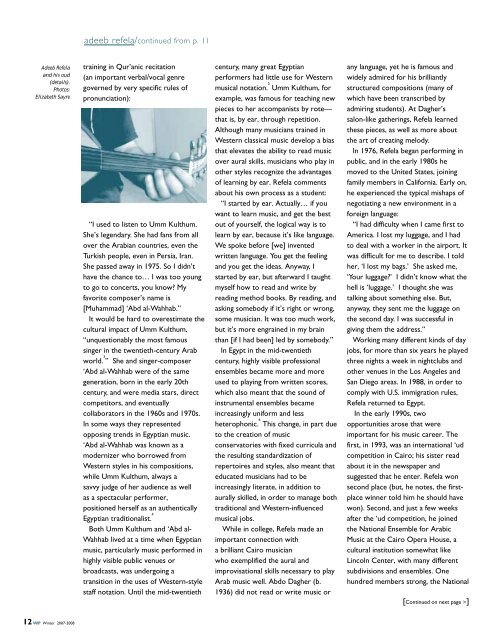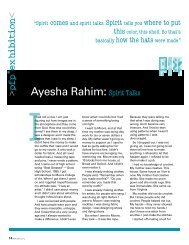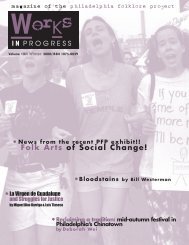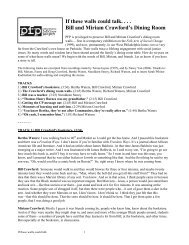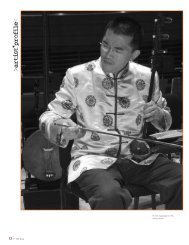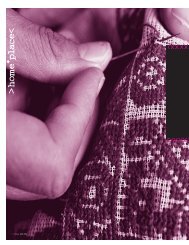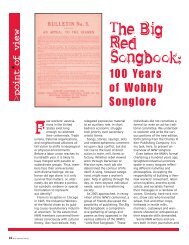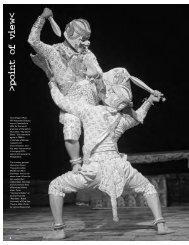African song / Fatu Gayflor ⢠War and wealth - Philadelphia Folklore ...
African song / Fatu Gayflor ⢠War and wealth - Philadelphia Folklore ...
African song / Fatu Gayflor ⢠War and wealth - Philadelphia Folklore ...
You also want an ePaper? Increase the reach of your titles
YUMPU automatically turns print PDFs into web optimized ePapers that Google loves.
adeeb refela/continued from p. 11<br />
Adeeb Refela<br />
<strong>and</strong> his oud<br />
(details).<br />
Photos:<br />
Elizabeth Sayre<br />
training in Qur’anic recitation<br />
(an important verbal/vocal genre<br />
governed by very specific rules of<br />
pronunciation):<br />
“I used to listen to Umm Kulthum.<br />
She’s legendary. She had fans from all<br />
over the Arabian countries, even the<br />
Turkish people, even in Persia, Iran.<br />
She passed away in 1975. So I didn’t<br />
have the chance to… I was too young<br />
to go to concerts, you know? My<br />
favorite composer’s name is<br />
[Muhammad] ‘Abd al-Wahhab.”<br />
It would be hard to overestimate the<br />
cultural impact of Umm Kulthum,<br />
“unquestionably the most famous<br />
singer in the twentieth-century Arab<br />
world. 3 ” She <strong>and</strong> singer-composer<br />
‘Abd al-Wahhab were of the same<br />
generation, born in the early 20th<br />
century, <strong>and</strong> were media stars, direct<br />
competitors, <strong>and</strong> eventually<br />
collaborators in the 1960s <strong>and</strong> 1970s.<br />
In some ways they represented<br />
opposing trends in Egyptian music.<br />
‘Abd al-Wahhab was known as a<br />
modernizer who borrowed from<br />
Western styles in his compositions,<br />
while Umm Kulthum, always a<br />
savvy judge of her audience as well<br />
as a spectacular performer,<br />
positioned herself as an authentically<br />
Egyptian traditionalist. 4<br />
Both Umm Kulthum <strong>and</strong> ‘Abd al-<br />
Wahhab lived at a time when Egyptian<br />
music, particularly music performed in<br />
highly visible public venues or<br />
broadcasts, was undergoing a<br />
transition in the uses of Western-style<br />
staff notation. Until the mid-twentieth<br />
century, many great Egyptian<br />
performers had little use for Western<br />
musical notation. 5 Umm Kulthum, for<br />
example, was famous for teaching new<br />
pieces to her accompanists by rote—<br />
that is, by ear, through repetition.<br />
Although many musicians trained in<br />
Western classical music develop a bias<br />
that elevates the ability to read music<br />
over aural skills, musicians who play in<br />
other styles recognize the advantages<br />
of learning by ear. Refela comments<br />
about his own process as a student:<br />
“I started by ear. Actually… if you<br />
want to learn music, <strong>and</strong> get the best<br />
out of yourself, the logical way is to<br />
learn by ear, because it’s like language.<br />
We spoke before [we] invented<br />
written language. You get the feeling<br />
<strong>and</strong> you get the ideas. Anyway, I<br />
started by ear, but afterward I taught<br />
myself how to read <strong>and</strong> write by<br />
reading method books. By reading, <strong>and</strong><br />
asking somebody if it’s right or wrong,<br />
some musician. It was too much work,<br />
but it’s more engrained in my brain<br />
than [if I had been] led by somebody.”<br />
In Egypt in the mid-twentieth<br />
century, highly visible professional<br />
ensembles became more <strong>and</strong> more<br />
used to playing from written scores,<br />
which also meant that the sound of<br />
instrumental ensembles became<br />
increasingly uniform <strong>and</strong> less<br />
heterophonic. 6 This change, in part due<br />
to the creation of music<br />
conservatories with fixed curricula <strong>and</strong><br />
the resulting st<strong>and</strong>ardization of<br />
repertoires <strong>and</strong> styles, also meant that<br />
educated musicians had to be<br />
increasingly literate, in addition to<br />
aurally skilled, in order to manage both<br />
traditional <strong>and</strong> Western-influenced<br />
musical jobs.<br />
While in college, Refela made an<br />
important connection with<br />
a brilliant Cairo musician<br />
who exemplified the aural <strong>and</strong><br />
improvisational skills necessary to play<br />
Arab music well. Abdo Dagher (b.<br />
1936) did not read or write music or<br />
any language, yet he is famous <strong>and</strong><br />
widely admired for his brilliantly<br />
structured compositions (many of<br />
which have been transcribed by<br />
admiring students). At Dagher’s<br />
salon-like gatherings, Refela learned<br />
these pieces, as well as more about<br />
the art of creating melody.<br />
In 1976, Refela began performing in<br />
public, <strong>and</strong> in the early 1980s he<br />
moved to the United States, joining<br />
family members in California. Early on,<br />
he experienced the typical mishaps of<br />
negotiating a new environment in a<br />
foreign language:<br />
“I had difficulty when I came first to<br />
America. I lost my luggage, <strong>and</strong> I had<br />
to deal with a worker in the airport. It<br />
was difficult for me to describe. I told<br />
her, ‘I lost my bags.’ She asked me,<br />
‘Your luggage?’ I didn’t know what the<br />
hell is ‘luggage.’ I thought she was<br />
talking about something else. But,<br />
anyway, they sent me the luggage on<br />
the second day. I was successful in<br />
giving them the address.”<br />
Working many different kinds of day<br />
jobs, for more than six years he played<br />
three nights a week in nightclubs <strong>and</strong><br />
other venues in the Los Angeles <strong>and</strong><br />
San Diego areas. In 1988, in order to<br />
comply with U.S. immigration rules,<br />
Refela returned to Egypt.<br />
In the early 1990s, two<br />
opportunities arose that were<br />
important for his music career. The<br />
first, in 1993, was an international ‘ud<br />
competition in Cairo; his sister read<br />
about it in the newspaper <strong>and</strong><br />
suggested that he enter. Refela won<br />
second place (but, he notes, the firstplace<br />
winner told him he should have<br />
won). Second, <strong>and</strong> just a few weeks<br />
after the ‘ud competition, he joined<br />
the National Ensemble for Arabic<br />
Music at the Cairo Opera House, a<br />
cultural institution somewhat like<br />
Lincoln Center, with many different<br />
subdivisions <strong>and</strong> ensembles. One<br />
hundred members strong, the National<br />
[Continued on next page >]<br />
12 WIP Winter 2007-2008


